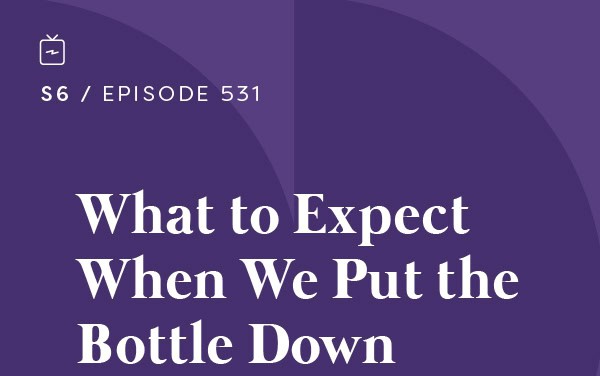Podcast: Play in new window | Download
Subscribe to the Recovery Elevator Podcast Apple Podcasts | RSS | More
Today we have Maggie. She is 42 years old, from Switzerland, and she took her last drink on February 24th, 2024.
Sponsors for this episode include:
Better Help – 10% off of your first month
Café RE – the social app for sober people
Registration for our annual alcohol-free retreat in Bozeman is now open. From August 6th through 10th, we will be spending lots of time in nature, doing breathwork, a lakeside hangout, laser tag and more.
In October of this year, we are going to Peru! There are still spots available for this 11-day 12-night journey throughout Cusco, Machu Picchu and the Sacred Valley.
[02:43] Thoughts from Paul:
A question Paul hears and sees frequently is what to expect when we put the bottle down. He shares that the destruction of alcohol happens in three steps. First the spiritual component, then mental and finally physical. Healing tends to happen in the reverse order. There will be overlap and the transition is not quite linear, nor does the healing ever stop.
Paul expands on what to expect when healing begins and how it can look for our bodies and minds in the first week, month, six months to a year.
[12:06] Paul introduces Maggie:
Maggie is from Switzerland but lives in Hong Kong with her husband Chris and their four dogs. They enjoy spending time on the beach, stand up paddling and triathlons. Professionally, Maggie was the head of IT in investment banking but has recently changed careers and now is an options equity trader.
Maggie says she had her first drink when she was 13 and instantly felt relief from her anxiety. During her teen years, she says she and her friends spent a lot of time going out to bars and she discovered clubbing and cocaine when she was 18.
Maggie did well in school and started working with hedge funds after graduating. She says the workdays ended at 4pm and everyone would go out to have drinks afterwards. Her drinking wasn’t concerning to her at this point in time.
Maggie moved to Hong Kong when she was 24 and this is when she began to realize that she didn’t have an off switch when it came to alcohol. Everyone else would be ready to go home and Maggie says she was just getting started.
From the age of 20 to around 30, Maggie says things got progressively worse. While everything looked successful and stable on the outside, inside she was falling apart. Maggie would compare herself with people that were worse off than her as a way to justify her drinking. Moderation entered the picture, and she would sign up for a lot of physical activities as a way to force herself to be sober.
Maggie moved to Singapore before COVID but then lost her job and was there for a year without her husband. That is when she went from binge drinking to daily drinking. Upon her return to Hong Kong, her husband told her she needed to go to AA.
After four years of stops and starts while trying to make AA work, Maggie knew she needed to try something different. Addicted to multiple substances, Maggie checked herself into rehab but relapsed as soon as she left. After her return to Hong Kong, Maggie tried another location where they used EMDR therapy which helped her find the root causes of her addiction issues.
Maggie was given Antabuse after leaving rehab and that has helped alcohol become a non-negotiable for her. In sobriety she learned that she couldn’t return to her old job. She has made a career change that allows her to work less hours and find a new hobby creating and selling her art.
Maggie feels peaceful now. Her goals are to continue to do sports and be a better athlete, continue to travel and maintain her current peaceful lifestyle.
Maggie’s parting piece of guidance: hang in there and you will eventually get there. Never give up and maybe also explore the root cause of what is causing the drinking in the first place.
Recovery Elevator
This isn’t a no to alcohol but a yes to a better life.
I love you guys.



